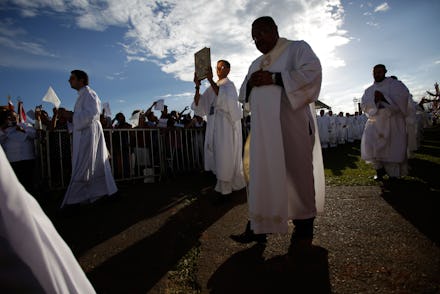Ridley Scott's Exodus Whitewashes the Bible By Casting Only White Actors

I looked at the cast list for Ridley Scott's Moses biopic, Exodus, and found myself experiencing a conundrum. While I'm a huge fan of the actors that have been cast, I'm upset and perplexed by Mr. Scott's choices. This is because the film's director and producers decided to cast only white actors in the film's most important roles, while leaving brown actors as extras in the background. Christian Bale is playing Moses. He's one of Hollywood's biggest and most talented actors whose dedication to filmmaking is well known by the extremes he's willing to endure for a role. Opposite Mr. Bale is the Australian born Joel Edgerton as the Egyptian Pharaoh, Ramses II, whose performance in 2011's Warrior and in 2013's The Great Gatsby has placed him in my top 10 list of underrated and underappreciated actors. Classic performers like Sigourney Weaver, John Turturro, Ben Kingsley, and Aaron Paul (of Breaking Bad fame) round out the list.
With the abundance of talent in the cast of Exodus, I should be perfectly fine with these actors in their character roles, but I'm not. Whitewashing biblical movies presents the characters of the early Western creation story as a homogenous, Euro-centric bloc instead of acknowledging the diversity of that has existed in our society for thousands of years. This whitewashing edits our creation myth through the same lens that justified the European concept of Orientalism during the Imperial conquests of the 18th and 19th centuries and continues to be the basis of the Ku Klux Klan's Christian-inspired racism.
Would biblical stories be any different or less impactful if the characters were all dark skinned? Given the geographical location of the Bible stories in the Old Testament, the time frame for the reign of Ramses II (beginning around 1280 B.C.), and the fact that the mummified corpse of Ramses seems to be a man with Asiatic features, should the film's producers have employed a more diverse cast? Why are references to Moses' Cushitic or Ethiopian wife along with his family's rejection of the marriage absent from the film? Such a critical response to the cast of Exodus assumes that the stories in the bible are true.
If you, like me and Sarah Lawrence professor (and George Lucas mentor) Joseph Campbell, view the Bible as a collection of fictional stories about fictional people who symbolize the angst and fear associated with the human condition, then the color and complexion of one's skin is moot. I have stated in the past that movie roles should go to the best actor regardless of race. Denzel Washington was brilliant as Don Pedro, the Prince of Aragon, in Kenneth Branagh's adaptation of Shakespeare's Much Ado About Nothing. The Bible, of course, is different. Whether or not you take it to be truth or fiction, its stories shape traditions and norms that in turn shape us. Accuracy to the time, location, and culture in which these stories originate help us understand the motivations of the original storytellers.
Myths endure because their messages and themes present a common narrative about our lives. It's a narrative that has touched Europeans, Africans, Asians, and Middle Easterners, as a part of the Western creation myth. Identity politics and fear of the other is an undeniable part of what it means to be human, but if we whiteout the long history of diversity that reaches back millennia, we let an important aspect of our humanity slip through our hands.